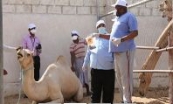Lebanon is an upper-middle-income country with a population size of 4.467 million (2013)1. The per capita gross national income (GNI) is U$ 9.870 (2013)1. The Human Development Index of Lebanon is 72 out of 186 countries (2012)2. It is a pivotal country because of its position between three continents. It is still in epidemiological transition whereby communicable diseases remain prevalent but noncommunicable diseases are on the rise.
A national contingency plan was developed in Lebanon for avian and pandemic influenza, with stockpiling of Oseltamivir. There is a sentinel severe acute respiratory infection surveillance project that will be implemented systematically in the country. Initially, it will be started in two sites in Beirut and Bekaa. Later, it will be expanded to include other areas.
The Rafik Hariri University Hospital laboratory is very well equipped. It is planned to be recognized as a national influenza centre in Lebanon. Virus isolation and sequencing exist at the laboratory and will soon be fully functional. Polymerase chain reaction testing is also available and is already functioning. Serology is the only type of testing not available. This laboratory has good collaboration with the Ministry of Public Health in Lebanon and it serves as a public health laboratory in many programmes and activities. The laboratory facilities are split into two molecular biology laboratories, one for the clinical cases and the other for research activities.
The American University of Beirut Hospital is a well-organized hospital with an infection control programme already in place. The laboratories are fully quality control compliant and automated to provide timely results. In the St George University Hospital the microbiology and molecular biology laboratories test respiratory samples for a range of respiratory viruses (influenza A, influenza B and respiratory syncytial virus), isolated H1N1 and H3N2 viruses by reverse real-time polymerase chain reaction testing.
Strengths
Intensive capacity-building in the public and private health sectors has been developed in Lebanon, reaching more than 2000 health professionals from various disciplines and institutions. An important effort was generated to build up national capacity in terms of emergency planning and response. This covered both the public and private health sectors and a multidisciplinary core team of around 1700 health professionals across the country.
Partnership Contribution funds are expected to benefit Lebanon in revamping the National Influenza Centre and also to establish an influenza-like illness and severe acute respiratory infection surveillance system within its routine disease surveillance system. The Partnership Contribution funds are expected to address the gaps and help build the capacity of the country to provide good quality representative baseline data from this influenza transmission zone.
Gaps and recommendations
Lebanon has a large population living abroad who visit the country during the summer season. This population mix, with varying demographic characteristics, makes the country vulnerable to co-circulation, thus raising the risk of mutation in different influenza viruses.
Lebanon does not have a regular seasonal influenza laboratory surveillance system. Currently, there is a gap in surveillance for severe acute respiratory infection and influenza-like illness despite the strategic location of the country. Collaboration with officers in charge of the quality system and the biorisk programme in the Ministry of Public Health is a must to ensure the quality of results and a safe work environment. One or two medical facilities should be selected to serve as collecting sites for seasonal influenza specimens.
The quality system and the biorisk programme need to be strengthened at Rafik Hariri University Hospital laboratory. This laboratory has sequencing capacity that could be used in the near future for further characterization of isolated influenza viruses. The hospital should continue to test respiratory samples for influenza viruses by reverse real-time polymerase chain reaction and refer positive samples to NAMRU3 for characterization.
Other university hospitals in Beirut could be added in the near future as collecting sites for influenza surveillance. In Bekaa Private Hospital, the laboratory does not perform molecular testing of influenza viruses.







